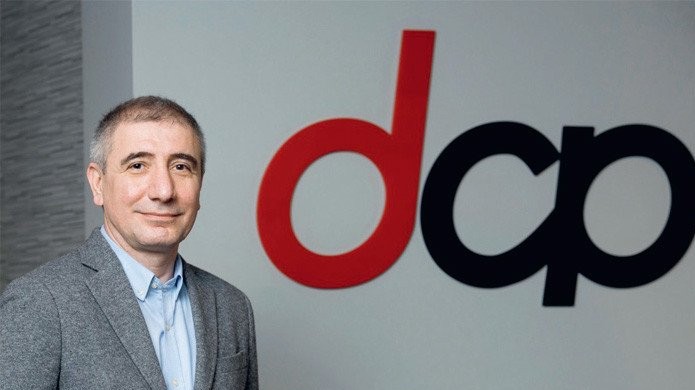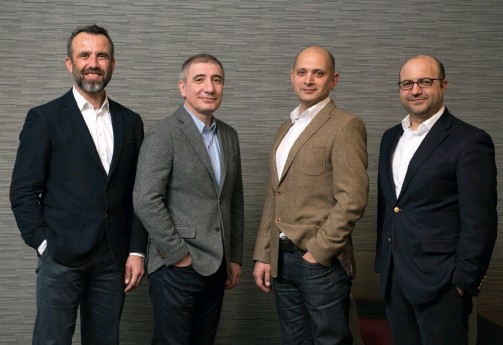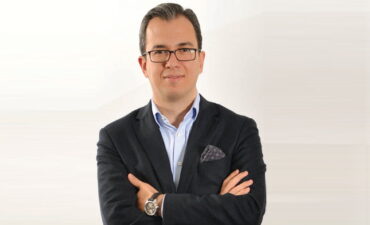DCP is Turkey’s first deep-tech investor and invested 37 million Euros with the first fund, now the second fund will be operational by the end of September

As Turkey’s first deep-tech fund, Diffusion Capital Partners (DCP) was founded in 2015 by four partners. “When choosing our investments, we opt for those developing and producing technology. We stay away from businesses that merely use technology and carry out business model innovation” said Haluk Zortul, Founding Partner at DCP. Having closed the first fund with 37 million Euros, DCP will continue to increase the number of investments with the new fund with a target size of 35 million Euros, which will become operational by the end of September. Here is what Haluk Zontul told me.
DCP is one of the first VCs in Turkey. Can you tell me the story of DCP? How was the Turkish startup scene in those years?
Diffusion Capital Partners (DCP) is Turkey’s first “Deep-Tech” fund, which provides technologically-oriented enterprises with capital during the first stages of their development. DCP started in 2015 as with 4 partners; Alper Karagöz, Altan Küçükçınar, Fırat Özpınar and myself.
We believe that technological innovation is key in creating added value, achieving a competitive advantage in the international markets, and for sustainable development.
For this reason, we focus on technology developing businesses. The enterprises that are not easy to replicate and copy, and feel the need, and have the background for deeper research and development are referred to as deep-tech opportunities in the world, rather than enterprises and business models that merely use technology.
Deep-tech has recently started to draw greater attention especially with the rapid developments in the field of machine-learning and artificial intelligence, genetics and biotechnology, as well as advanced materials, 3D printing and robotics technologies.
The first fund we closed in 2015 was 37 million Euros. From this fund, we made 18 investments in various fields.
We will continue to increase the number of our investments with our new fund with a target size of 35 million Euros, which will become operational by the end of September (2020). While making investments, we also exit from some of our portfolio companies. Until now we have had a total of 7 exits, 4 of which were related to our experiences prior to DCP, and 3 being from DCP portfolio. We are planning to invest in around 15-20 companies with our new fund. We operate in two offices in Istanbul and Ankara.
As a VC company, how do you raise your capital? How much did you invest so far?
We collect our funds from 5 different groups of investors. The first is the group we refer to as Development Financial Institutions (DFIs). This group includes several organisations in Turkey, Europe and the USA. The second group consists of finance institutions in Turkey. Certain pioneering portfolio management companies in Turkey choose to cooperate with fund managers such as DCP in order to allocate part of their resources in technology, and they become investors in our funds. The third group consists of corporations. Corporations, for instance holding companies, banks, insurance companies and large companies in other industries may invest in the funds we manage under various motivations. The fourth group is formed by qualified individual investors. Channelling part of their assets to technological investments that may bring a high yield through funds managed by DCP, has become a recent trend for qualified individual investors. The last group consists of universities. Technoparks and Technology Transfer Offices of the universities invest in funds focused on technology in order to develop their own ecosystems.
Among some of the enterprises that are currently found in our portfolio are Cellsway, which produces chips capable of diagnosing cancer using blood, Beeo, which produces functional foods with propolis that strengthens the immune system, Episome, the industrial enzymes producer that puts paper sludge waste to use, Baps, which produces bioactive screws and pins that are used in orthopaedics operations, Medrics, a supplier of software solutions that improve patient experience, Magspin, the transparent ceramics producer that supplies products for the jewellery and defence industries, Virasoft, which produces digital pathology software solutions, Atarlabs, a supplier of cybersecurity automation software solutions, Entekno, a producer of special-form zinc oxide for the cosmetics industry, Appsilon, which produces diamonds in a laboratory, Burgeon, a producer of collagen-increasing fillers used in plastic surgery, Tazi, which offers machine-learning software solutions, and Nubigon, which offers three-dimensional point cloud software solutions for the architecture and construction sector.
As DCP, do you have any specific industry preference to invest in?
When choosing our investments, we opt for those developing and producing technology. We stay away from businesses that merely use technology and carry out business model innovation. Instead, we prioritise businesses, which are capable of producing new technology, and which have a high level of technological component that has not been attempted before, and which is not easy to perform and reproduce. We are deeply convinced that sustainable growth is possible only through mastering technology. Especially today, when technological development has become very rapid, we see this to be the real fountain of opportunities.
Up to now we made investments in cybersecurity, artificial intelligence and machine learning, SaaS, digital healthcare software, medical devices, enzyme technologies, microelectronics, functional goods, and advanced materials.
In the field of informatics; cybersecurity, blockchain, artificial intelligence and machine learning, SaaS, internet of things, corporate software, microelectronics. In the field of life sciences; medical devices, diagnostic devices, bio-informatics, genetics, digital healthcare software. In the field of clean technologies; energy efficiency, smart grids, energy storage, biofuels. In the field of agricultural technologies; agricultural biotechnology, internet of things-based data solutions; In the field of new food technologies; sustainable protein, functional foods contributing to treatment. In the field of advanced materials; Efficient and green materials for industrial use, biomaterials, smart materials. In the field of defence; dual-use technologies are subjects in which we are interested, and in which we are eager to invest.
We would like to invest in enterprises that produce technology, and whose products and services we may position in the international markets.
What are your main criteria when you decide to invest in a startup?
We have three main criteria when we decide to invest in a startup: is the enterprise based on a technological superiority and research and development? Does it address a problem that is compatible with global trends resulting in great shifts? Does it have the potential to have a significant portion of its turnover coming from international markets within a few years following investment?
If the answers to these three questions are yes, we proceed with the detailed assessment stage, examining the team, market and scalability.

How long does it take for you to understand whether a startup will fail or continue?
Before investing in enterprises, we subject them to a lengthy assessment process. The objective of this assessment is to reveal the compatibility of both the existing abilities and the potential with our expectations. If we are happy with the result, we make an investment in order to implement a busines plan that would achieve this potential. Although deviations at a reasonable level are always possible, we expect a company to bring the fundamental components of its business plan to life in 2-3 years. Companies that are able to use this period efficiently increase their chance of success. Prolonging it, however, may be the indicator of problems.
As you compare Turkish startups with global competitors, what are the pros and cons of the Turkish ones?
We believe that enterprises and entrepreneurs in Turkey can easily compete with their foreign peers. There are many qualified researchers especially in the deep-tech field, which is our primary focus. We observe that these researchers are becoming increasingly willing to commercialise the accumulated knowledge they have.
The greatest obstacle entrepreneurs face in Turkey involves access to fund resources. An increase in the number of funds such as ours is necessary. We are still way below the fund resource required to respond to the potential in our country. We believe that the enterprises originating in our country will achieve greater success with an increase in the number and sizes of funds.
On a global scale, what kind of startups will gain significance especially in the days of COVID-19?
We believe that one of the most important impacts of the pandemic on economy will be a further localisation of supply chains. The logistics, certification and foreign trade processes are undergoing severe changes. It appears that physical access to markets will become even more difficult. States will take steps to increase their own level of preparedness, and reduce their dependence on foreign sources, in sectors such as security, agriculture and defence, but especially in the health sector. Innovation in the field of healthcare is by nature a field of investment that requires greater research and development, as well as certification and preparation. It is a field in which long-term planning and resource management comes to the fore, which is harder to scale, but therefore has higher entry thresholds, and to which funds investing in business model innovation remain more distant. Therefore, we expect an increase in the number and investment volume of deep-tech funds, such as ours, which invest especially in the field of healthcare.
As in all fields, digitalisation is very important in the field of healthcare, and the importance of the shift to digitalisation has been better understood as a result of the pandemic. But this is also a field where it is more difficult for startups to operate due to the reasons explained above. We foresee a period when cooperation between startups and large companies will increase, as we witnessed in the context of the pandemic in our company Virasoft, which operates in the field of digital pathology and received investment from Türk Telekom Ventures. We observed the cooperation between startups and large companies and the potential effects of such cooperation, especially during the development of the domestic ventilator. We expect such cooperation efforts to increase through various models. Certain corporations will establish their own corporate venture capital funds, while others will become investors especially to funds that invest in the field of deep-tech, thereby developing strategic collaboration or co-investment mechanisms with these funds. We believe that the importance of investment experience will increase in the field of healthcare.
We believe that another field that is changing is online education. We observe that variants especially of tools such as zoom specialising in various fields of education will gain popularity. Again, we believe that the recent interest shown in Virasoft’s pathology education and joint consultation tools is a strong indicator to this effect.
The pandemic showed us that market dominance, which is not supported by technological superiority and depending on the control of access channels, is very fragile. The markets that are available to you today can become inaccessible tomorrow. Travel restrictions, controls increasing at customs can suddenly leave you out. If you have competitors that are in greater control of these channels, you risk the sudden loss of years of efforts. Deep-tech enterprises draw their competitive advantages from technological superiority, and are more immune to such difficulties in access.
During the pandemic we sold our company AtarLabs, one of our portfolio companies, which operates in the field of cybersecurity, to a global software company and another company operating in the field of healthcare technologies, Virasoft, concluded an important round of investment. Our other companies are also in similar negotiations mostly with global players. As far as we can see, global players are seeking to take advantage of the pandemic to acquire technologies to complement their own portfolios. Qualified technology companies are able to close funding rounds even at the height the pandemic, when the ambiguity is at its highest, since they possess a sustainable competitive advantage.
That’s all I want to know. If you have anything extra, please add.
We would like to share some brand new and very important news with you.
Entekno, our next-generation functional materials technology company in Eskişehir, which we added to our portfolio in 2017, received a 1,5 million-pound investment from the British company Croda, a giant of the high-performance materials sector. We are happy that Entekno has received an international investment from an important player of the high-performance material sector such as Croda, especially in these days when the entire world is undergoing a serious economic transformation, and proving the importance of deep-tech.
The sunscreens developed by Entekno provide a higher level of protection with less active materials thanks to their active UV protection effect, also prevent the forming of visible residue on the skin with their transparent and environment-friendly characteristics. Providing a safer level of UV protection with a low a low cost through MicNo particle technology helps create particles that appear transparent under the sun while not penetrating the skin. The sunscreens produced using this superior technology can also be used on sensitive skin and for babies.
The investment made by industry-leader Croda in a very promising startup such as Entekno will prove a very valuable experience for us. Croda, in turn, will be able to access very valuable technical information, and innovative and high-quality products will be included in Croda’s portfolio. As DCP, we consider it very important to bring a Startup to a position, in which it receives investment from an international company.
Would you like to support TR Technews?
Hi everyone,
I’m running Turkishtechnews.com, a website on tech developments from Turkey. I will be covering subjects ranging from startups to gadgets, digital economy to social media. I’m keen on new technologies as well. On top of those, I’m interested in drama and cinema, with one short and one long film script and three plays. Holding a B.A degree in English Language and Literature, I’m a tech journalist with 15 years of experience.
The reason why I’m here is to produce good quality journalism and try to remain independent as much as possible. Currently, journalism is torn between vague relationships between brands and journalists, not only in Turkey but also globally. Under such circumstances to remain independent is crucial and I need your support to do so.








